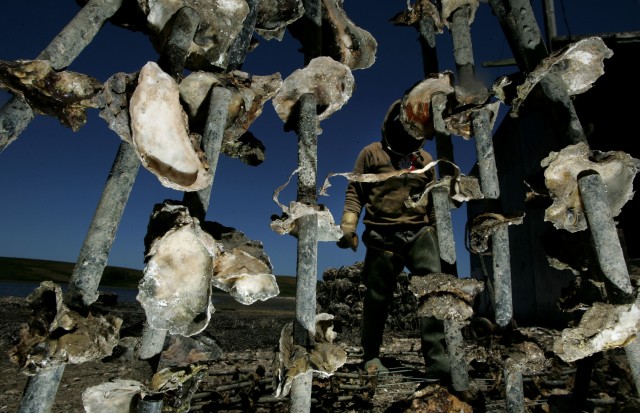"Agencies most of the time do the right thing, but sometimes they make mistakes, sometimes they abuse their power," Prow said. "In this case we think that's exactly what has happened, from the Parks Service and the Department of the Interior, and the 9th Circuit has said we don't even have a chance to have our day in court. And we think that if people can't take agencies to court when agencies misbehave, that's a very troubling precedent for not just the oyster farm but for anyone who deals with the government on any kind of permit or lease or any kind of day-to-day regular application to the government."
A spokeswoman for the Interior Department said it couldn't comment on pending litigation.
News Fix's Dan Brekke recounted the history of the conflict in a blog post in January.
At issue in the case is the conflict between Lunny’s decade-old campaign to win an extension to the oyster company’s lease and National Park Service plans to designate Drakes Estero, the operation’s site, as wilderness. Lunny has long maintained that the park service not only could but should extend the 40-year “reservation of use and occupancy” first granted in 1972 when the government bought the property from the operation’s previous owner. The National Park Service, operating under provisions of the 1976 Point Reyes Wilderness Act, informed Lunny in 2005 of its intention not to extend the lease beyond its expiration date in 2012.
One of Lunny’s chief allies, Sen. Dianne Feinstein, lobbied for an extension of the lease and in 2009 managed to win approval of legislation authorizing the secretary of the Interior to grant a 10-year extension to the Drakes Bay Oyster Co. After a long review process marked by charges that the National Park Service had manipulated data to show the oyster farm was harmful to the environment, Salazar declined to extend the lease.
Among other reasons, Salazar cited the government’s original agreement to purchase the oyster farm’s property, Park Service policy limiting commercial operations in national parks and wilderness areas, and the requirements of the 1976 Point Reyes law. He also acknowledged the scientific uncertainty over the oyster operation’s environmental and recreational impacts, but said in his view that studies backed the view that letting the lease expire “would result in long-term beneficial impacts to the estero’s natural environment.”
Salazar’s decision required Drakes Bay Oyster Co. to vacate its premises within 120 days, a departure delayed when Lunny filed suit in December 2012 to block the Interior secretary’s action. The lawsuit alleged that Salazar had violated the National Environmental Policy Act, which requires an assessment of agency impacts on the human environment, and the federal Administrative Policy Act, which guides government decision-making policies. Ultimately, a federal judge in San Francisco rejected Lunny’s request for a preliminary injunction to halt the Department of Interior’s action, leading to the 9th Circuit appeal and today’s decision denying a rehearing.
The case has caused a split between environmental groups that support wilderness restoration at Point Reyes and leaders of the sustainable food movement, who praise Drakes Bay as a model operation. Both sides submitted “friend of the court” briefs during the Drakes Bay appeal. A group of local restaurateurs were among those who filed a brief arguing that closing the operation “would have a broad, negative and immediate impact, on the local economy and the sustainable agriculture and food industry in the San Francisco Bay Area, on the school children of the workers who live in the housing units onsite, and, in the longer term, on food security and the U.S. balance of trade.”
The case has become a cause celebrate of sorts for libertarian-leaning organizations, and Drakes has been supported by the conservative Pacific Legal Foundation, which frequently sues government agencies on behalf of businesses and individuals. Earlier on in the case, the issue was taken up by Cause of Action, an anti-government group led by a lawyer with ties to the Charles Koch Foundation. From Kelly O'Mara's piece last month for California Lawyer:
Accepting Cause of Action's help seemed sensible to Lunny at first, since it was free. But he ended the relationship soon after PBS NewsHour aired a segment in May 2013 that mentioned the group's involvement. Lunny says his frustration was less about bad PR than the fact that Cause of Action had used his name in publicizing unrelated issues and in arguing for a newspaper to reveal unnamed sources who criticized the oyster farm in a story. But the group's involvement cemented Drakes Bay's position in the center of larger national debates over conservation, management of all types of federal land, and the limits of federal authority. It also made clear how important a precedent Lunny's case could set.
